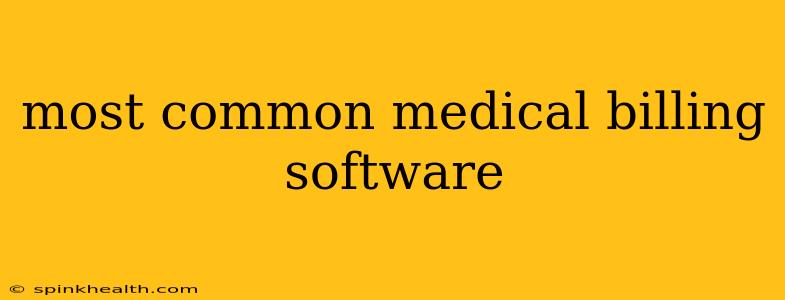The Wild West of Medical Billing: Taming the Chaos with the Right Software
The world of medical billing can feel like the Wild West – chaotic, unpredictable, and filled with potential pitfalls. But just as cowboys needed their trusty steeds and six-shooters, medical professionals need reliable billing software to navigate this complex landscape. Choosing the right software can mean the difference between financial stability and crippling debt. This isn't just about processing claims; it's about ensuring your practice thrives.
My journey into this world started with a small, family-run clinic. We were drowning in paperwork, struggling to keep track of insurance claims, and constantly worried about missed payments. The frustration was palpable, impacting not just our finances, but our morale too. Then we discovered medical billing software. It wasn't a magic bullet, but it was transformative.
This article will explore some of the most common medical billing software options, helping you understand the features to look for and ultimately, choose the perfect partner for your practice.
What are the Most Popular Medical Billing Software Options?
This isn't a simple "top 5" list, because the "best" software depends heavily on your specific practice size, specialty, and budget. However, some names consistently emerge as leaders in the field. These include (but aren't limited to) Kareo, Practice Fusion, athenahealth, NextGen Healthcare, and Medical Manager. Each offers a unique set of features and caters to different needs.
What Features Should I Look for in Medical Billing Software?
Choosing the right software isn't just about picking a name; it's about understanding your needs. Here's what to prioritize:
- Claim Submission and Processing: This is the core function. Look for software that seamlessly integrates with various insurance providers, automating the claim submission process and tracking their progress.
- Patient Management: Efficiently managing patient demographics, insurance information, and appointment scheduling is crucial. Integrated patient portals are a bonus, improving communication and patient satisfaction.
- Reporting and Analytics: Gaining insights into your billing performance is essential for financial planning and identifying areas for improvement. Comprehensive reporting features should be a must-have.
- Compliance: Staying compliant with ever-changing HIPAA regulations is paramount. Your chosen software should have built-in safeguards and regular updates to ensure compliance.
- Integration with EHR (Electronic Health Record): Seamless integration with your EHR system streamlines workflows and prevents data entry errors.
- Customer Support: Reliable customer support is vital. Consider the availability and responsiveness of the support team before committing.
What is the Difference Between Cloud-Based and On-Premise Software?
This is a fundamental decision.
Cloud-Based Software: This software resides on the provider's servers, accessible from anywhere with an internet connection. It's often more affordable and requires less IT maintenance.
On-Premise Software: This software is installed on your practice's servers. It offers greater control over your data but requires significant IT infrastructure and maintenance.
How Much Does Medical Billing Software Cost?
Pricing varies dramatically depending on the features, the vendor, and your practice's size. Some offer monthly subscription models, while others charge per license or per user. Expect to invest a significant amount, but remember, it's an investment in your practice's financial health.
Is Medical Billing Software User-Friendly?
The user-friendliness varies widely. Some software is intuitive and easy to learn, while others require extensive training. Look for software with a user-friendly interface and comprehensive training resources.
Can I Integrate Medical Billing Software with My Existing Systems?
Many modern medical billing software options offer various integration capabilities, allowing seamless data exchange with your EHR, patient portals, and other practice management systems. However, always verify compatibility before committing to a specific software.
My journey with medical billing software wasn't immediate success, but it was a journey of growth. It required research, careful consideration, and a willingness to adapt. By making an informed decision based on our practice's needs, we transformed our business. The right software isn't just a tool; it's a strategic partner in the success of your medical practice.

